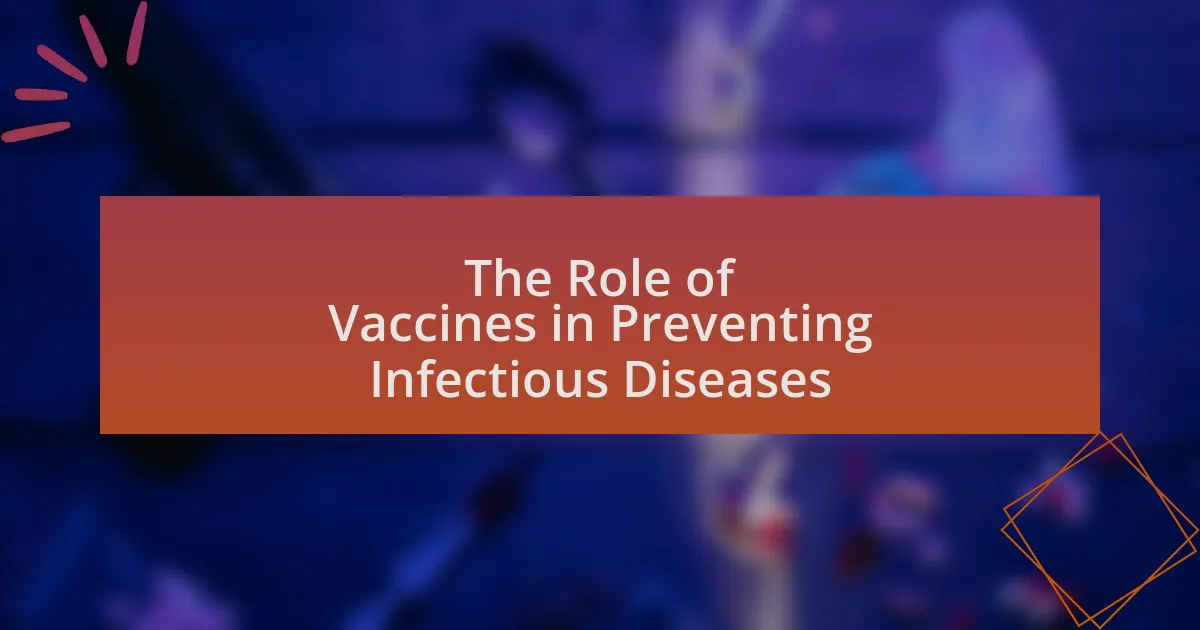The article focuses on recent advancements in immunotherapy for cancer treatment, highlighting key developments such as immune checkpoint inhibitors, CAR T-cell therapies, and personalized cancer vaccines. It discusses how these innovations have transformed cancer treatment by improving survival rates and providing targeted therapies with fewer side effects compared to traditional treatments. Specific cancers that have benefited from these advancements, including melanoma and lung cancer, are examined, along with the mechanisms behind immunotherapy’s effectiveness. The article also addresses challenges in implementation, variability in patient responses, and the role of personalized medicine in shaping future therapies. Additionally, it explores current research trends and the impact of technology, including artificial intelligence, on the development of new immunotherapeutic strategies.
What are the recent advancements in immunotherapy for cancer treatment?
Recent advancements in immunotherapy for cancer treatment include the development of novel immune checkpoint inhibitors, CAR T-cell therapies, and personalized cancer vaccines. Immune checkpoint inhibitors, such as pembrolizumab and nivolumab, have shown significant efficacy in various cancers by blocking proteins that inhibit immune responses. CAR T-cell therapies, like tisagenlecleucel, have demonstrated remarkable success in treating hematologic malignancies by genetically modifying patients’ T cells to target cancer cells. Additionally, personalized cancer vaccines are being designed to stimulate the immune system based on the unique mutations present in an individual’s tumor, enhancing the specificity and effectiveness of the treatment. These advancements are supported by clinical trials indicating improved survival rates and response rates in patients receiving these innovative therapies.
How have these advancements changed the landscape of cancer treatment?
Advancements in immunotherapy have significantly transformed the landscape of cancer treatment by providing targeted therapies that enhance the body’s immune response against tumors. These therapies, such as checkpoint inhibitors and CAR T-cell therapy, have led to improved survival rates and better outcomes for patients with previously hard-to-treat cancers. For instance, studies have shown that patients with metastatic melanoma treated with pembrolizumab, a checkpoint inhibitor, experienced a 40% overall survival rate at five years, compared to traditional therapies. This shift towards personalized and less toxic treatment options marks a pivotal change in oncology, allowing for more effective management of various cancer types.
What specific types of cancer have benefited from these advancements?
Specific types of cancer that have benefited from advancements in immunotherapy include melanoma, lung cancer, bladder cancer, and certain types of leukemia and lymphoma. For instance, the introduction of immune checkpoint inhibitors, such as pembrolizumab and nivolumab, has significantly improved survival rates in patients with advanced melanoma, with studies showing a 40% response rate. Additionally, lung cancer treatments utilizing immunotherapy have led to a 20% increase in overall survival compared to traditional therapies. These advancements demonstrate the effectiveness of immunotherapy in targeting and treating various malignancies.
How do these advancements compare to traditional cancer treatments?
Advancements in immunotherapy for cancer treatment offer more targeted and personalized approaches compared to traditional cancer treatments like chemotherapy and radiation. Traditional treatments often affect both cancerous and healthy cells, leading to significant side effects, while immunotherapy harnesses the body’s immune system to specifically target and destroy cancer cells, resulting in fewer adverse effects. For instance, studies have shown that immune checkpoint inhibitors, a form of immunotherapy, can lead to durable responses in patients with melanoma, with a 5-year survival rate of approximately 34% compared to 10% for those receiving traditional chemotherapy. This demonstrates that advancements in immunotherapy not only improve efficacy but also enhance the quality of life for patients undergoing cancer treatment.
What are the key mechanisms behind immunotherapy advancements?
The key mechanisms behind immunotherapy advancements include immune checkpoint inhibition, CAR T-cell therapy, and cancer vaccines. Immune checkpoint inhibitors, such as pembrolizumab and nivolumab, block proteins that inhibit T-cell activation, thereby enhancing the immune response against tumors. CAR T-cell therapy involves genetically modifying a patient’s T-cells to express chimeric antigen receptors, enabling them to target and destroy cancer cells more effectively. Cancer vaccines stimulate the immune system to recognize and attack cancer cells by presenting tumor-associated antigens. These mechanisms have been validated through clinical trials demonstrating improved survival rates and responses in various cancers, such as melanoma and hematologic malignancies.
How do immune checkpoint inhibitors work in cancer treatment?
Immune checkpoint inhibitors work in cancer treatment by blocking proteins that prevent the immune system from attacking cancer cells. These inhibitors, such as pembrolizumab and nivolumab, target specific checkpoints like PD-1 and CTLA-4, which are mechanisms that tumors exploit to evade immune detection. By inhibiting these checkpoints, the immune response is enhanced, allowing T cells to recognize and destroy cancer cells more effectively. Clinical studies have shown that patients treated with immune checkpoint inhibitors have experienced improved survival rates and durable responses in various cancers, including melanoma and lung cancer.
What role do CAR T-cell therapies play in recent advancements?
CAR T-cell therapies play a pivotal role in recent advancements in immunotherapy for cancer treatment by providing targeted and personalized approaches to combat malignancies. These therapies involve engineering a patient’s T-cells to express chimeric antigen receptors (CARs) that specifically recognize and attack cancer cells. Clinical trials have demonstrated significant efficacy, particularly in hematological cancers, with studies showing that CAR T-cell therapies can lead to complete remission in a substantial percentage of patients with refractory diseases, such as acute lymphoblastic leukemia and certain types of lymphoma. For instance, the approval of CAR T-cell therapies like Kymriah and Yescarta has marked a transformative shift in treatment paradigms, showcasing the potential for durable responses and improved survival rates in previously untreatable cases.
What are the challenges faced in the implementation of immunotherapy?
The challenges faced in the implementation of immunotherapy include variability in patient response, high treatment costs, and the need for personalized treatment approaches. Variability in patient response arises because not all patients have the same immune system characteristics, leading to differing effectiveness of immunotherapy. High treatment costs can limit access for many patients, as some immunotherapies can exceed hundreds of thousands of dollars annually. Additionally, the need for personalized treatment approaches complicates implementation, as identifying the most effective therapy for each individual often requires extensive testing and monitoring. These factors collectively hinder the widespread adoption and effectiveness of immunotherapy in cancer treatment.
Why do some patients respond differently to immunotherapy?
Some patients respond differently to immunotherapy due to variations in their immune system, tumor characteristics, and genetic factors. Individual immune responses can be influenced by the presence of specific biomarkers, such as PD-L1 expression levels, which can affect how well the immune system recognizes and attacks cancer cells. Additionally, tumor mutational burden, which refers to the number of mutations within a tumor, can impact the effectiveness of immunotherapy; higher mutational burdens often correlate with better responses. Genetic predispositions, including inherited traits that affect immune function, also play a significant role in treatment outcomes. Studies have shown that these factors contribute to the heterogeneity in patient responses, highlighting the complexity of tailoring immunotherapy to individual needs.
What factors influence the effectiveness of immunotherapy in patients?
The effectiveness of immunotherapy in patients is influenced by several key factors, including the type of cancer, the patient’s immune system status, and the specific immunotherapy used. Different cancers respond variably to immunotherapy; for instance, melanoma and lung cancer have shown significant responses, while others may not. The patient’s immune system plays a crucial role; individuals with a robust immune response are more likely to benefit from treatment. Additionally, the choice of immunotherapy, such as checkpoint inhibitors or CAR T-cell therapy, impacts outcomes, as some therapies are more effective for certain cancer types. Studies have shown that biomarkers, such as PD-L1 expression, can predict response to specific immunotherapies, further underscoring the importance of these factors in determining treatment effectiveness.
How can adverse effects of immunotherapy be managed?
Adverse effects of immunotherapy can be managed through early recognition, supportive care, and the use of immunosuppressive agents. Early identification of symptoms such as rash, diarrhea, or fatigue allows for timely intervention, which can mitigate the severity of these effects. Supportive care includes hydration, nutritional support, and symptomatic treatment to improve patient comfort. In cases of severe adverse effects, corticosteroids or other immunosuppressive medications may be administered to reduce inflammation and immune response. Studies have shown that prompt management of these side effects can lead to better overall treatment outcomes and improved quality of life for patients undergoing immunotherapy.
What are the current research trends in immunotherapy for cancer?
Current research trends in immunotherapy for cancer focus on enhancing the efficacy of immune checkpoint inhibitors, developing personalized cancer vaccines, and exploring combination therapies. Immune checkpoint inhibitors, such as those targeting PD-1 and CTLA-4, have shown significant success in various cancers, prompting ongoing studies to identify biomarkers that predict patient response. Personalized cancer vaccines aim to stimulate the immune system by using neoantigens specific to an individual’s tumor, with clinical trials demonstrating promising results in improving patient outcomes. Additionally, researchers are investigating combination therapies that pair immunotherapy with traditional treatments like chemotherapy or targeted therapies to enhance overall effectiveness, as evidenced by studies showing improved survival rates in patients with advanced cancers.
What novel approaches are being explored in clinical trials?
Novel approaches being explored in clinical trials for cancer treatment include personalized cancer vaccines, CAR-T cell therapy, and immune checkpoint inhibitors. Personalized cancer vaccines are designed to stimulate the immune system based on the unique mutations present in an individual’s tumor, enhancing the body’s ability to target cancer cells. CAR-T cell therapy involves genetically modifying a patient’s T cells to better recognize and attack cancer cells, showing promising results in hematological malignancies. Immune checkpoint inhibitors, such as PD-1 and CTLA-4 blockers, are being tested to enhance immune responses against tumors by preventing cancer cells from evading immune detection. These approaches are supported by clinical trial data demonstrating improved patient outcomes and survival rates in various cancer types.
How is personalized medicine shaping the future of immunotherapy?
Personalized medicine is significantly shaping the future of immunotherapy by enabling tailored treatment strategies that enhance efficacy and minimize adverse effects. This approach utilizes genetic, biomarker, and phenotypic information from individual patients to identify the most effective immunotherapeutic agents and combinations for their specific cancer type. For instance, the use of PD-1 and PD-L1 inhibitors has been optimized through biomarker testing, allowing clinicians to select patients who are most likely to respond, thereby improving overall survival rates. Studies have shown that patients with high levels of PD-L1 expression have better outcomes when treated with these inhibitors, demonstrating the effectiveness of personalized approaches in immunotherapy.
What are the future prospects for immunotherapy in cancer treatment?
The future prospects for immunotherapy in cancer treatment are highly promising, with ongoing advancements expected to enhance efficacy and broaden applicability. Research indicates that combination therapies, integrating immunotherapy with traditional treatments like chemotherapy and radiation, are likely to improve patient outcomes. For instance, studies have shown that combining immune checkpoint inhibitors with targeted therapies can lead to higher response rates in various cancer types. Additionally, the development of personalized cancer vaccines and CAR T-cell therapies is anticipated to provide tailored treatment options, further increasing the effectiveness of immunotherapy. The growing understanding of the tumor microenvironment and immune evasion mechanisms is also expected to drive innovations in immunotherapy, leading to more effective strategies against resistant cancers.
How might advancements in technology impact immunotherapy?
Advancements in technology significantly enhance immunotherapy by improving treatment precision and efficacy. For instance, innovations in genomic sequencing allow for the identification of specific tumor mutations, enabling personalized immunotherapy approaches that target individual cancer profiles. Additionally, the development of artificial intelligence algorithms aids in predicting patient responses to immunotherapy, optimizing treatment plans based on historical data and patient characteristics. Furthermore, advancements in delivery systems, such as nanoparticles, enhance the targeted delivery of immunotherapeutic agents, minimizing side effects and maximizing therapeutic impact. These technological improvements collectively contribute to more effective and tailored cancer treatment strategies.
What role will artificial intelligence play in developing new therapies?
Artificial intelligence will play a crucial role in developing new therapies by enhancing drug discovery processes and personalizing treatment plans. AI algorithms can analyze vast datasets, including genomic information and clinical trial results, to identify potential therapeutic targets and predict patient responses to specific treatments. For instance, a study published in Nature Biotechnology demonstrated that AI models could predict the efficacy of immunotherapy drugs based on tumor characteristics with over 90% accuracy. This capability allows for more efficient and targeted development of therapies, ultimately improving patient outcomes in cancer treatment.
What practical steps can patients take to explore immunotherapy options?
Patients can explore immunotherapy options by consulting with their oncologist to discuss potential eligibility for immunotherapy treatments. This initial step allows patients to understand their specific cancer type and stage, which are critical factors in determining suitable immunotherapy options. Following this, patients should seek information from reputable sources such as the American Society of Clinical Oncology or the National Cancer Institute, which provide detailed insights into available immunotherapy treatments and clinical trials. Additionally, patients can inquire about clinical trials at their treatment center or through platforms like ClinicalTrials.gov, which lists ongoing studies that may offer access to cutting-edge immunotherapy options. Engaging in discussions with support groups or patient advocacy organizations can also provide valuable insights and shared experiences regarding immunotherapy.
How can patients find clinical trials for immunotherapy treatments?
Patients can find clinical trials for immunotherapy treatments by utilizing online databases such as ClinicalTrials.gov, which lists ongoing and completed trials worldwide. This resource provides detailed information about the trials, including eligibility criteria, locations, and contact information for researchers. Additionally, patients can consult their healthcare providers, who may have access to information about local trials or can refer them to specialists involved in immunotherapy research. Academic medical centers and cancer treatment facilities often have dedicated staff to assist patients in identifying suitable clinical trials.
What questions should patients ask their healthcare providers about immunotherapy?
Patients should ask their healthcare providers about the specific type of immunotherapy being recommended for their condition. This includes inquiries about how the treatment works, potential side effects, the expected duration of treatment, and how it compares to other treatment options. Additionally, patients should ask about the criteria for determining treatment effectiveness and any clinical trials that may be available. These questions are crucial as they help patients understand their treatment plan and make informed decisions regarding their healthcare.





